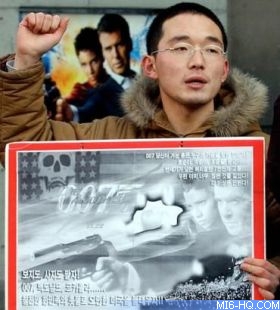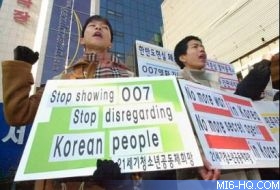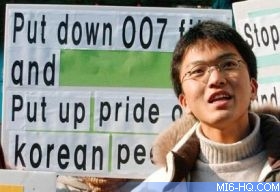 |
| |
The release of "Die Another Day" in Korea
sparked huge protests from both sides of the border.
MI6 has the roundup...
|
|
Korea Protests Against "Die Another Day"
10th January 2003
"Die Another Day" features a renegade North Korean
villain, Colonel Moon, hell bent on taking over the South by means
of a military invasion over the Demilitarised Zone (DMZ) after
Icarus has cleared their path across the minefield.
The film was bound to cause a stir in the region, but nobody
could predict the strength of the protests. Both North and South
Korea found reasons to launch boycotts against Bond's latest adventure.
North Korea
North Korea were voicing their distaste at 007's latest mission
even before the film had entered production. The Korea Federation
of University Student Councils issued a statement in December
2001 calling for production to be cancelled.
Shortly before DAD opened in Korea, a 20th Century Fox Korea
spokesmen anticipated the ill feeling towards the films and said
"There are some misunderstandings of the movie. The enemy
described in the movie is extreme nationalists, not North Korea".
But Lee Tamahori poured fuel on the fire by saying "To hell
with North Korea. It's a basket-case country and the sooner its
leaders all roll over and die, the better." In an interview
just as protests in North Korea were reaching their peak.
 Above: A South Korean student shouts slogans during
a rally to protest.
Above: A South Korean student shouts slogans during
a rally to protest. |
|
This caused the Secretariat of the Committee for the "Peaceful
Reunification of the Fatherland" to issue a statement
calling for the US to stop to screenings of DAD in North
Korea and called is a "dirty and cursed burlesque aimed
to slander North Korea and insult the Korean nation".
The statement, issued to the Korean Central News Agency,
went on to say "The movie describes the Democratic
People's Republic of North Korea as part of an 'axis of
evil', inciting inter-Korean confrontation, groundlessly
despising and insulting the Korean nation and malignantly
desecrating even religion".
Korean-American actor Rick Yune, who plays Zao in "Die
Another Day", tried to quell the controversy by saying
"The enemy in the movie is not North Korea, but the
individual he plays". He also went on to say that "The
movie has nothing to do with Bush's characterisation of
North Korea in January 2001 as part of an 'axis of evil'
because the story was written four years ago".
|
| South Korea
Meanwhile in South Korea - where the film opened later
than North Korea - physical protests against the film were
more prevalent as protesters surrounded cinemas in Seoul
waving banners and causing mayhem for people wanting to
see the film on New Years Eve.
The reasons for protest against DAD in South Korea were
not the same as the North. A national boycott was attempted
on the grounds that the film depicted South Korea as a US
Colony, and activists claimed boycotting the film was necessary
inorder to protect national pride. The US keeps 37,000 troops
in South Korea after the Korean war of 1950-1953.
|
|
 Above: A South Korean soldier walks past
an advertisement at the premiere in Seoul on New Year's
Eve.
Above: A South Korean soldier walks past
an advertisement at the premiere in Seoul on New Year's
Eve. |
|
Further controversy arose when South Korean Buddhists discovered
Bond and Jinx make love in a Buddhist temple at the end
of the film. The Jogye, South Korea's largest Buddhist order,
issued a statement saying "This is a slight to Buddhism,
which has purified the culture and mind of mankind for 2,700
years".
The order went on to say the film was "distorting
warming ties between South and North Korea and inciting
conflict". Buddhism is the biggest religion in South
Korea, with about 12 million followers among the 46 million
population.
|
|
 Above: South Korean high school students
shout a slogan during a rally in Seoul.
Above: South Korean high school students
shout a slogan during a rally in Seoul. |
 Above: Another student at the Seoul demonstrations.
Above: Another student at the Seoul demonstrations. |
|
A cinema outside if Seoul finally bowed to pressure and
cancelled all showings of "Die Another Day" after
less than a week of release in the country.
Despite the protests (infact some cinema goers said they
were going because of all the media attention) "Die
Another Day" opened well in both North and South Korea,
but takings were down to approximately 65% of the level
achieved by "The World Is Not Enough".
South Korea is Fox International's 10th highest grossing
territory.
|